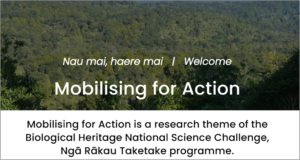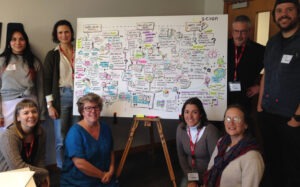Summary
In this project we explored what hinders and enables researchers, policymakers and practitioners in their work protecting native trees and forests in New Zealand/Aotearoa and Wales/Cymru. This is an international collaborative project between the two countries called Post-colonial biosecurity possibilities. Through interviews and workshops we discussed with stakeholders systemic issues related to tree health and surrounding our abilities to mobilise, share and value diverse knowledge to support this. This led to discussions about care, relational values, and from this we developed a set of rubric cards to transform unnoticed systemic biosecurity issues into conscious attempts to do things differently. The social science contribution to biosecurity has the potential to reconnect tree systems and human systems both in place and conceptually through research and management practices. The research is part of a wider programme in New Zealand called Mobilising for Action.

Research Objectives
The research aimed to explore relational values, care for trees and inherited colonial biases with a specific focus on biosecurity practices. The two contexts in Aotearoa (New Zealand) and Wales were clearly different with regard to colonisation, and in relation to the plant pathogens being considered. In Aotearoa, the focus was on kauri dieback and myrtle rust, while different pathogens and pests are impacting tree health in Cymru (Wales) including Ash dieback – Hymenoscyphus fraxineus and Phytophthora ramorum. The data collection, analysis, and mapping were managed as complimentary, not contrasting, with insights shared from the context in each country to the other.
Latest Update
A series of interviews and workshops were held with forest pathologists, microbiologists, Kaupapa Māori researchers and biosecurity practitioners. The participants talked about the need to reconnect humans and nature, the importance of community input, the benefits of iwi/hapū involvement in forest biosecurity initiatives, the value of mātauranga-based solutions, and the skills required to work together.
In the Welsh interviews and workshops with policymakers and practitioners we discussed biosecurity practices, relational values for treescapes, and the drive for woodland creation and expansion in Wales. Stakeholders identified tensions between biosecurity issues and numerical targets related to tree planting. To meet Net Zero targets, the Welsh government has put in place an ambitious tree planting strategy. As part of the discussions about this strategy, there was a strong desire to ensure that the right tree is planted in the right place. Partnership collaboration and engagement was suggested as important to learn lessons across organisations and also to bring biosecurity higher up the agenda.
Wales research team:


New Zealand research team:

Our Involvement
Forest Research is a collaborator in the research project
General Content
Outputs from the research to date:
Positioning Research to Improve Tree-Biosecurity Relations (addletonacademicpublishers.com)
How can non-Māori talk about postcoloniality? — Mobilising For Action
Funding & Partners
-
 Mobilising for Action is a research theme of the Biological Heritage National Science Challenge, Ngā Rākau Taketake Programme in New Zealand
Mobilising for Action is a research theme of the Biological Heritage National Science Challenge, Ngā Rākau Taketake Programme in New Zealand
